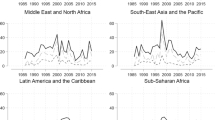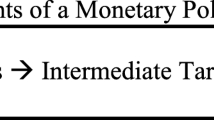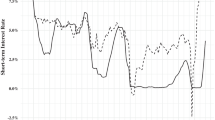Abstract
The impact of government debt on the money supply has been studied for different countries, with an emphasis on developing countries and the U.S. This topic becomes especially interesting in European Union countries that have high public deficits and low inflation rates. It is also very relevant in the monetary union, with a European central bank controlling monetary policy and introducing monetary measures for all the member countries. The main goal of this paper is to analyze if there is any relationship between public deficits and monetary growth in the European Union. The conclusions presented in the previous literature are ambiguous. Some studies concluded that there is little evidence that government debt influences money in some of the member countries.
Similar content being viewed by others
References
Cukierman, A.Central Bank Strategy, Credibility and Independence: Theory and Evidence, Cambridge, MA: The MIT Press, 1992.
De Grauwe, P.The Economics of Monetary Integration, Oxford, England: Oxford University Press, 1992.
De Haan, J.; Zelhorst, D. "The Impact of Government Deficits on Money Growth in Developing Countries,"Journal of International Money and Finance, 9, 1990.
Doornick, J. A.; Hendry, D. F.PcGive 8.0: An Interactive Econometric Modeling System, London, England: International Thomson Publishing, 1984.
Dornsbusch, R.; Fischer, S. "Budget Deficits and Inflation," in J. Flanders; A. Razin, eds.,Development in an Inflationary World, New York, NY: Academic Press, 1981.
Fischer, S. "Seigniorage and the Case for a National Money,"Journal of Political Economy, 90, 2, 1982.
Galindo, M. A. "La Independencia de los Bancos Centrales: Importancia, Efectos e Implicaciones,"Información Comercial Española, May 1996.
Haliassos, M.; Tobin, J. "The Macroeconomics of Government Finance," in B. M. Friedman; F. H. Hahn, eds.,Handbook of Monetary Economics, Vol. 2, Amsterdam: North-Holland, 1990.
Healy, J.; Page, S. "The Use of Monetary Policy," in S. Page, ed.,Monetary Policy in Developing Countries, London, England: Routledge, 1993.
Hendry, D. F.Dynamic Econometrics, Oxford, England: Oxford University Press, 1995.
Hossain, A.; Chowdhury, A.Monetary and Financial Policies in Developing Countries, London, England: Routledge, 1996.
Turnovsky, S. J.Methods of Macroeconomic Dynamics, Cambridge, MA: The MIT Press, 1995.
Author information
Authors and Affiliations
Rights and permissions
About this article
Cite this article
Alonso, A., Galindo, MA. The effects of public deficits on money growth in the European Union. International Advances in Economic Research 2, 394–401 (1996). https://doi.org/10.1007/BF02295463
Issue Date:
DOI: https://doi.org/10.1007/BF02295463




